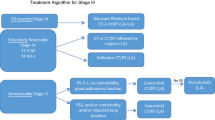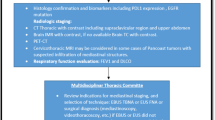Abstract
Lung cancer remains the leading cause of cancer-related death in the United States. Small cell lung cancer (SCLC) comprises 15% to 25% of all lung cancers. The leading cause of lung cancer remains smoking, and rates of smoking continue to rise in women, whereas rates in other subgroups have slowed. In this article we review recent advances in the treatment of limited-stage as well as extensive-stage small cell lung cancer. In limitedstage disease, the best survival results are observed when patients are treated with twice-daily thoracic radiotherapy given concurrently with chemotherapy. Patients who have been successful in smoking cessation during therapy for limited-stage disease may have a survival benefit over those who are unable to quit smoking during treatment. In extensive-stage disease, the most significant trial is one comparing irinotecan plus cisplatin and etoposide plus cisplatin, showing a survival advantage for the irinotecan arm. This trial may change the standard of care for patients with extensive-stage disease. A similar ongoing trial in the United States is attempting to confirm these results.
Similar content being viewed by others
References and Recommended Reading
Jemal A, Tiwari RC, Murray T, et al.: Cancer statistics 2004. CA Cancer J Clin 2004, 54:8–29.
Page NC, Read WL, Tierney RM, et al.: The epidemiology of small cell cancer [abstract]. Proc ASCO 2002, 21:305a.
Turrisi AT, Kim K, Blum R, et al.: Twice-daily compared with once-daily thoracic radiotherapy in limited small-cell lung cancer treated concurrently with cisplatin and etoposide. N Engl J Med 1999, 340:265–271.
Bonner JA, Sloan JA, Shanahan TG, et al.: Phase III comparison of twice-daily split-course irradiation versus once-daily irradiation for patients with limited stage small-cell lung carcinoma. J Clin Oncol 1999, 340:2681–2691.
Takada M, Fukuoka M, Kawahara M, et al.: Phase III study of concurrent versus sequential thoracic radiotherapy in combination with cisplatin and etoposide for limited-stage smallcell lung cancer: results of the Japan Clinical Oncology Group Study 9104. J Clin Oncol 2002, 20:3054–3060.
Fried DB, Morris DE, Hensing TA, et al.: A meta-analysis evaluating the timing of thoracic radiation therapy in combined modality therapy for limited-stage small cell lung cancer. Int J Radiat Oncol Biol Phys 2003, 57(Suppl):S139-S140.
Videtic GMM, Stitt LW, Dar AR, et al.: Continued cigarette smoking by patients receiving concurrent chemoradiotherapy for limited-stage small cell lung cancer is associated with decreased survival. J Clin Oncol 2003, 21:1544–1549. Although this is a retrospective study, it is thought provoking and provides evidence that we can present to our patients as motivation to stop smoking during treatment for their SCLC.
Schiller JH, Kim KM, Hutson P, et al.: Phase II study of topotecan in patients with extensive-stage small cell carcinoma of the lung: an Eastern Cooperative Oncology Group Trial. J Clin Oncol 1996, 14:2345–2352.
Masuda N, Fukuoka M, Kusunoki Y, et al.: CPT-11: a new derivative of camptothecin for the treatment of refractory or relapsed small-cell lung cancer. J Clin Oncol 1992, 10:1225–1229.
Noda K, Nishiwaki Y, Kawara M, et al.: Irinotecan plus cisplatin compared with etoposide plus cisplatin for extensive small cell lung cancer. N Engl J Med 2002, 346:85–91. This phase III trial may change the standard of care for the treatment of SCLC.
Shepherd FA, Giaccone G, Seymour L, et al.: Prospective, randomized, double-blind, placebo-controlled trial of marimastat after response to first-line chemotherapy in patients with small-cell lung cancer: a trial of the National Cancer Institute of Canada-Clinical Trials Group and the European Organization for Research and Treatment of Cancer. J Clin Oncol 2002, 20:4434–4439.
Potti A, Moazzam N, Ramar K, et al.: CD117 (c-KIT) overexpression in patients with extensive-stage small-cell lung carcinoma. Ann Oncol 2003, 14:894–897.
Krystal GW, Honsawek S, Litz J, et al.: The selective tyrosine kinase inhibitor STI571 inhibits small cell lung cancer growth. Clin Cancer Res 2000, 6:19–26.
Soria JC, Johnson BE, LeChevalier T: Imatinib in small cell lung cancer. Lung Cancer 2003, 41:S49–53.
Betrand R, O’Connor R, Kerrigan D, et al.: Sequential administration of camptothecin and etoposide circumvents the antagonistic cytotoxicity of simultaneous drug administration in slowly growing human colon carcinoma HT-29 cells. Eur J Cancer 1992, 28A:743–748.
Schiller JH, Adak S, Cella D, et al.: Topotecan versus observation after cisplatin plus etoposide in extensive-stage smallcell lung cancer: E759: a phase III trial of the ECOG. J Clin Oncol 2001, 19:2114–2122.
Klasa RJ, Murray N, Coldman AJ: Dose-intensity meta-analysis of chemotherapy regimens in small-cell carcinoma of the lung. J Clin Oncol 1991, 9:499–508.
Ardizzoni A, Tjan-Heijnen V, Postmus PE, et al.: Standard versus intensified chemotherapy with granulocyte colonystimulating factor support in small-cell lung cancer: a prospective European Organization for Research and Treatment of Cancer-Lung Cancer Group phase III trial-08923. J Clin Oncol 2002, 20:3947–3955. This well-designed trial compared dose-intensive therapy with standarddose therapy for extensive-stage SCLC. No difference in survival was seen between these two groups.
Quero Blanco C, Lopez-Picazo JM, Boan J, et al.: Initial staging of small-cell lung cancer(SCLC) patients with 18FDG-PET and conventional imaging techniques [abstract]. Proc ASCO 2003, 22:2618. These authors were among the first to identify the still undefined role of PET scanning in SCLC. They conclude that PET scanning does not represent an improvement over conventional staging accuracy in SCLC.
Author information
Authors and Affiliations
Rights and permissions
About this article
Cite this article
Wolf, T., Gillenwater, H.H. Treatment options for small cell lung cancer. Curr Oncol Rep 6, 268–271 (2004). https://doi.org/10.1007/s11912-004-0034-1
Issue Date:
DOI: https://doi.org/10.1007/s11912-004-0034-1




